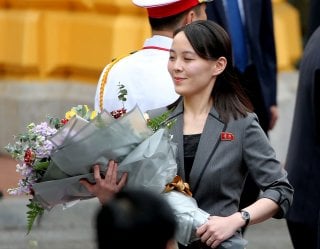Kim Yo-jong Could Take Over North Korea If Kim Jong-un Died (But There's a Catch)
What happens when Kim Jong-un's son comes of age?
Editor's Note: This is part of a symposium asking what happens if Kim Jong-un died. To read the other parts of the series click here.
The high tide of speculation over Kim Jong-un’s health, briefly rumored to be in critical condition, ebbed following his reappearance in public on May 1, 2020. The event reconfirmed not only the extremely clandestine nature of the North Korean regime but also the difficulty of ascertaining information about the hermit kingdom, particularly its top leader. Beyond that, the incident has reminded the international community of the need to prepare effective, cooperative contingency plans against the potentially catastrophic consequences of the leader’s untimely death. Possible terrible outcomes from Kim’s death could include civil war-like conditions followed by regime collapse, the influx of refugees, the mishandling of nuclear weapons and other materials, and uncoordinated foreign military intervention.
Of course, the recent re-emergence of Kim Jong-un in public has postponed the imminent significance of how the supreme leader’s sudden death or incapacitation would impact North Korea and all of East Asia. Nevertheless, the dilemma will continue to be widely discussed in the world community, especially considering that Kim’s reportedly poor health condition derived from his severe obesity, heavy smoking and alcohol consumption, intense stress, and family history of heart disease. For those reasons, it is prudent to ponder what could unfold if Kim were to become incapacitated or dead in both the short and long term.
The most likely scenario following Kim Jong-un’s abrupt death in the near future is that Kim Yo-jong, his younger sister, could assume power. Kim Yo-jong is well-known to possess the legitimacy to rule North Korea by virtue of descending from the Paektu bloodline—the Kim family line—as does her brother. She also has the capacity to work as a leader, given her experiences in the North Korean government since she was an adolescent, though it remains uncertain how effectively she could control military and intelligence agencies. Since the Pyeongchang Winter Olympics in February 2018, she has also promoted her political and diplomatic profile by closely supporting Kim Jong-un in a series of summits with South Korean, Chinese, and U.S. leaders. Furthermore, she would likely receive full support from the Organizational Guidance Department of the Korean Workers’ Party, which has established the ultimate power to control all North Korean state agencies. Given those credentials, the North Korean regime could manage a swift power transition from Kim Jong-un to Kim Yo-jong, as long as a power struggle does not arise between the current leader’s inner circle and unknown anti-Kim factions.
Another intriguing point of speculation is how North Korea’s internal power dynamics will unfold in the long term. Following the recent ado about his health, Kim Jong-un must have noticed that his sister Kim Yo-jong could rise as an influential successor to him. Such potential may have unsettled Kim Jong-un’s confidence in his power and the future succession to his position, particularly if he had not previously considered the possibility of his sister’s ascent. Although Kim Jong-un and his sister, who studied together in Switzerland for several years in the late 1990s, have cultivated a good relationship, it may bother the leader to see his sister’s power and reputation wax significantly on the national and international stage. It seems that Kim Jong-un has intentionally promoted his sister’s power status based on his closeness to and reliability on her. From now on, however, he might reconsider the necessity of promoting her influence. Furthermore, it is rumored that Kim Jong-un has a 10-year old son. Considering the patriarchal nature of North Korean society, over time Kim’s son will no doubt be groomed to become the state’s next supreme leader, assuming that Kim Jong-un continues to rule North Korea for the coming decades. In that process, however, a power struggle between Kim’s son and his supporters, on the one hand, and Kim Yo-jong and hers, on the other, could arise if Kim Jong-un died suddenly before a clear plan of succession is established.
Yangmo Ku is an Associate Professor of Political Science and Associate Director of the Peace and War Center at Norwich University.
Image: Reuters

